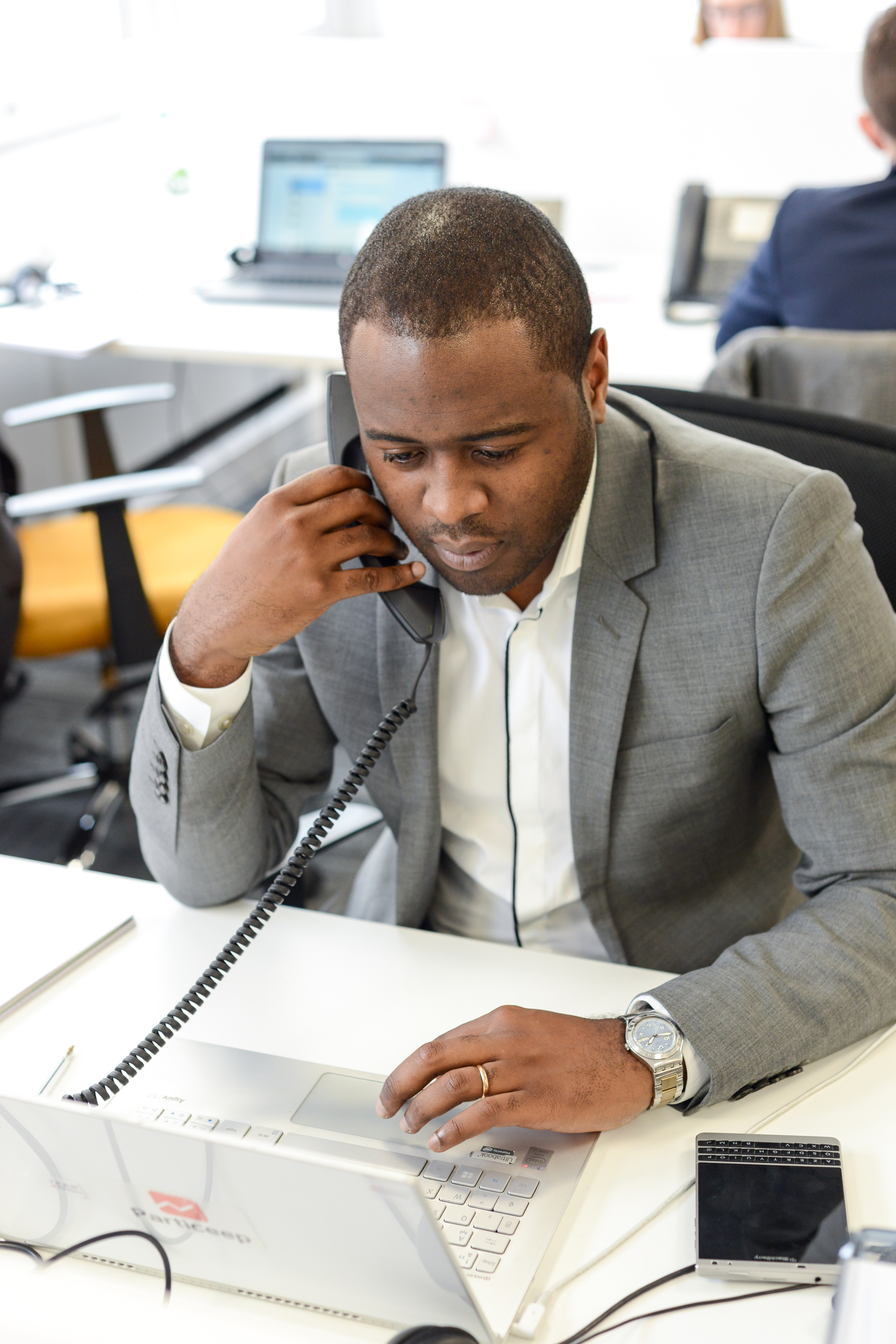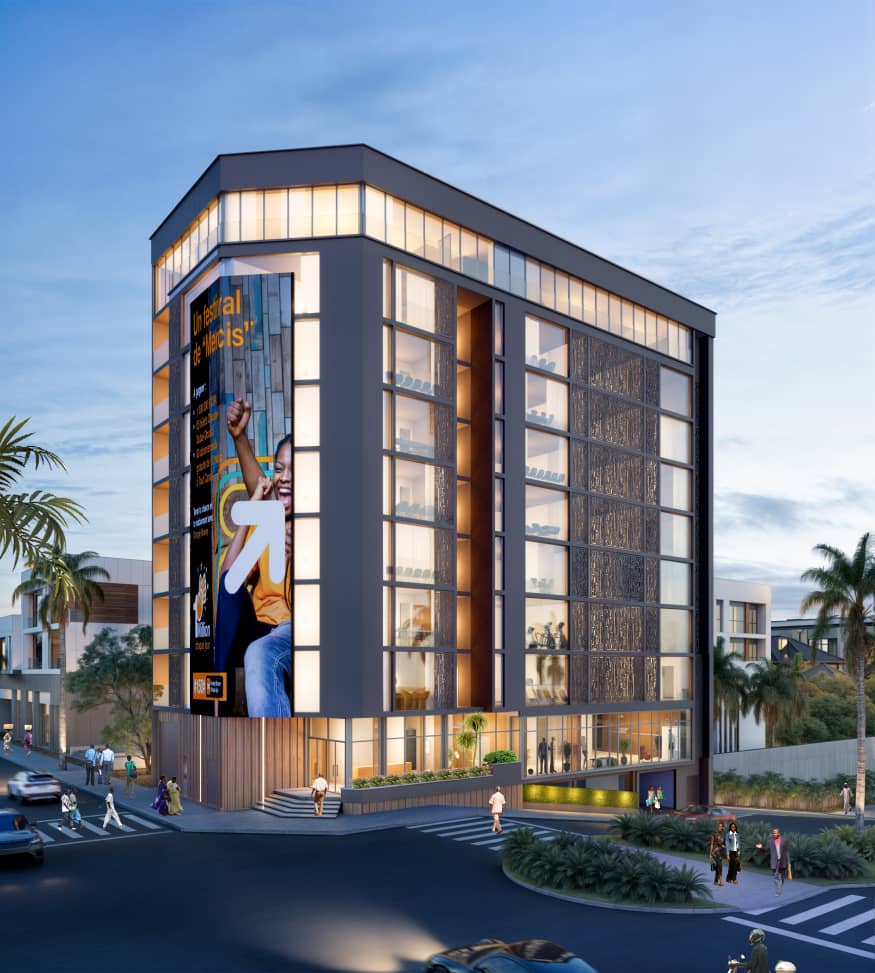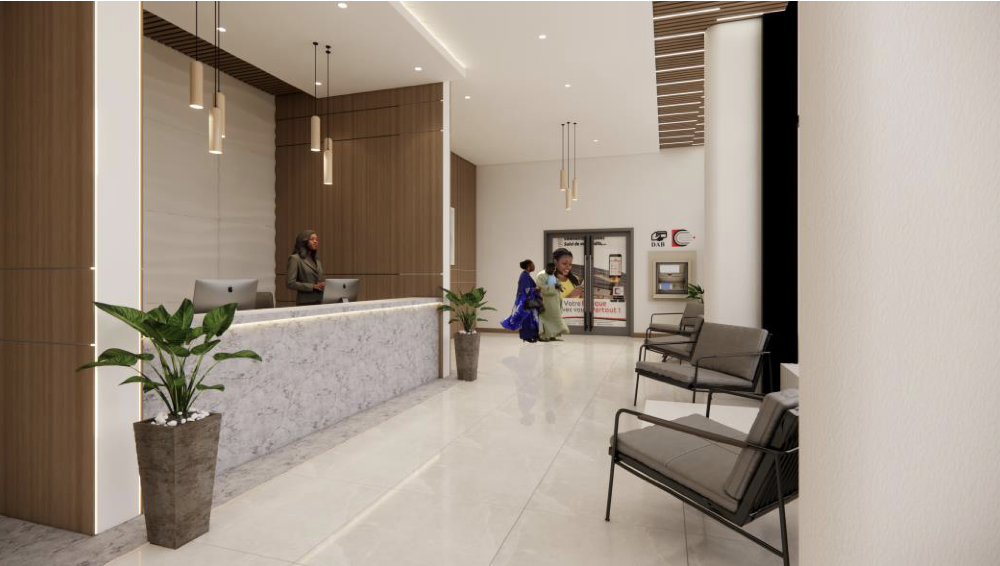Visionary and builder, Steve Fogue, former co-founder of the fintech Particeep, unveils Tour Ciel in Douala, a next-generation business center. This project, at the intersection of innovation and local grounding, embodies the rise of an entrepreneurial, sovereign, and ambitious Africa.
From particeep to fogiprom: The journey of a builder

In Douala, where he was born in 1985, Steve Fogue learned early that the future is never given—it must be earned. Born into an African context where opportunities are not always equally distributed, he grew up with two deep convictions: that education is a key, and that entrepreneurship can be a weapon. His career, both meteoric and exemplary, illustrates this belief.
After excelling in his studies at SKEMA Business School and then at École des Ponts ParisTech—one of France’s most prestigious engineering schools—Steve Fogue entered traditional finance. He worked at HSBC and Société Générale, where he sharpened his understanding of markets, financial mechanisms, and corporate structural needs. But the urge to create, innovate, and make an impact was already stirring within him.
In 2013, he took the leap. Particeep was born from his visionary insight: the digital transformation of financial services was inevitable, and France was lagging behind. With his co-founders, he developed a tech platform capable of fully digitizing banking and insurance products—from investment to subscription, including document management and regulatory compliance.
In just a few years, Particeep became one of France’s most promising fintech startups. It served major players like BPCE, Crédit du Nord, Crédit Agricole, AG2R La Mondiale, and Swiss Life. Its model was attractive for its modularity, scalability, and ability to integrate into existing systems without disruption.
Growth was exponential: over 80% annually, operational profitability above 200%, and a team of more than 50 employees. In 2022, the company was jointly acquired by Sopra Steria and Kereis—two giants in tech and insurance—marking a new era for Particeep.
But for Steve Fogue, success isn’t only measured in market share or revenue. It’s also about impact, legacy, and what one leaves behind. And for him, that legacy must also be rooted in Cameroon—his homeland—and more broadly in Africa, a continent of both opportunities and challenges.
His return wasn’t impulsive, but strategic. In 2017, he created Fivenso, a consulting and private investment firm, laying the groundwork for his future African ambitions. Then in 2022, he founded Fogiprom, his real estate development company, with a clear objective: to develop modern, elegant, sustainable infrastructure in Africa tailored to the real needs of businesses and urban populations.
Fogiprom is not just a developer—it’s an ideas lab. A company that views real estate as a lever for territorial development, and a tool for social and economic transformation. With this mindset, the Tour Ciel project—a new-generation business center in Douala—was born.
Steve Fogue represents a new wave of leaders from the diaspora: internationally trained, yet deeply connected to their roots. He believes in uniting global talent with local realities, in reinvesting in one’s home regions with a professional, rigorous, structured approach.
For him, returning to Cameroon is not nostalgia—it’s an economic and political choice. A leap of faith in the continent’s ability to take charge of its future, build its own models, and create its own symbols of success. Through Fogiprom, he seeks to show that Africa can deliver world-class infrastructure, powered by its own strength.
Tour ciel: A human-focused business center

At first glance, it’s just a building. But look closer, and Tour Ciel is a manifesto. Built in Kotto, a dynamic neighborhood in Douala’s 5th district, this 4,800 m² structure is more than construction—it’s a spatial vision of tomorrow’s city. Designed as a new-generation business center, it aims to redefine the use of space in Central Africa, blending functionality, aesthetics, and sustainability.
Tour Ciel rises eight stories high, crowned by a panoramic rooftop, with two underground levels for secure parking. From the ground floor, it sets the tone: a business bank, a spacious reception area, and shops opening onto the neighborhood. You’re not just entering a building—you’re stepping into a vibrant place.
Inside, it offers a modular universe where every square meter is optimized. Private offices, divisible floors ranging from 40 to 320 m², and a coworking space on the third floor—all designed to accommodate large firms, startups, digital nomads, and freelancers alike. The high-tech conference room seats over 100 people, perfect for business events, corporate presentations, and institutional meetings. Add to this a wellness center, lounge restaurants, rest areas, and even a rooftop bar for afterworks and professional gatherings.
A Strategic partnership with regus, the global leader in coworking
As part of its commitment to combining quality, innovation, and international reach, Fogiprom has entered into a strategic partnership with Regus, the global leader in flexible workspaces, to establish within Tour Ciel the very first next-generation Regus business center in Central Africa.
This groundbreaking partnership positions Tour Ciel as a world-class business hub. Spanning two floors (the 3rd and 4th levels), this 1,300 m² center will offer:
- fully equipped private offices,
- a modern coworking space fostering collaboration,
- connected meeting rooms,
- and professional business address services.
This initiative aligns with the transformation of work culture in Africa, driven by the rise of startups, the growth of SMEs, increasing demand for hybrid spaces, and the growing presence of international players in the sub-region.
Already established in South Africa, Nigeria, and Kenya, Regus centers have proven instrumental in structuring regional economic hubs.
With Douala, Regus is opening a new chapter—this time in collaboration with a visionary local partner.
“Our vision is to offer a space where professional efficiency, creative drive, meaningful pauses, and useful services like errands all come together,” explains Steve Fogue.
Tour Ciel is not merely a business center. It is an integrated urban ecosystem, a crucible of activity where productivity meets conviviality, where economy engages with culture, and where a workday no longer means isolation, but interaction.
From a technical perspective, nothing has been left to chance. The building meets international construction standards, features centralized air conditioning, video surveillance and fire detection systems, fiber optic connectivity, a backup generator, and intelligent energy management. Reflective glass, thermal insulation, and LED lighting contribute to a modern environmental approach. In Douala, Tour Ciel stands as a pioneer—anticipating both the energy and digital transitions of the region.
But beyond its structure, what truly distinguishes Tour Ciel is its philosophy. It has a human face. It rejects the cold impersonality of Western office towers. It celebrates natural light, wood, meeting spaces, and coffee breaks on the terrace. It is designed for women and men who want to work differently—under dignified, efficient, and inspiring conditions.
Tour Ciel is therefore more than just a building. It is a declaration of intent. A signal sent by a diasporic entrepreneur to the city where he was born: Africa deserves better than imported solutions. It can imagine its own models. Design them. Build them. And fully inhabit them.
A local ambition driven by a global vision
Though firmly rooted in Kotto, Tour Ciel looks far beyond Douala’s skyline. It embodies a powerful idea: Africa can build using its own resources, talents, and goals—while also engaging with the world as an equal. The infrastructure is local, but the strategy behind it is boldly global.
This flagship project would not have been possible without bold, innovative financial engineering—reflecting the international experience of its creator. Leading the operation is Fogiprom, Steve Fogue’s real estate development company, which handled every project phase—from architectural design to financing, environmental impact studies, and construction oversight.
Behind Fogiprom stands Fivenso, the strategic investment fund also founded by Fogue. It provided the initial equity, a foundation of trust essential for starting the work and lending credibility to the project. Based between France and Cameroon, Fivenso acts as a financial bridge between the African diaspora and local markets, bringing not just capital, but methodology, discipline, and a sustainable performance mindset.
The third pillar is Afriland First Bank, Cameroon’s leading bank, serving as a key financial partner. Its contribution helped bring the project to life and legitimize it with local economic actors. This tripartite setup (diaspora, private fund, local bank) is both innovative and exemplary. It shows that Africa can fund its own development by leaning on its diaspora and institutions, without relying solely on foreign donors or capital.
This hybrid financial approach, both sovereign and strategic, sends a powerful message: it is possible to develop vital infrastructure in Africa without outsourcing it. More than that, it’s possible to foster a new class of global African entrepreneurs—navigating international market demands while remaining grounded in local realities.
And the impacts are already visible. Upstream, Cameroonian architects, engineers, urban planners, and artisans were mobilized. During construction, dozens of jobs were created, local subcontractors engaged, and the site became a showcase of expertise. In the medium term, Tour Ciel will host up to 850 people, concentrating high-value-added activity in Kotto, whose real estate and commercial appeal is already on the rise.
But beyond numbers, a new governance model is emerging. One of endogenous development—neither naively Afro-optimistic nor stuck in Northern models—but built on African reality, shaped by African hands. This is Steve Fogue’s signature: build in Africa, for Africa, with Africans—without ever losing sight of global standards.
In this sense, Tour Ciel is not just a smart building—it’s a proof of concept. And perhaps, the beginning of a new chapter for Douala and African entrepreneurship.
A model for an innovative africa

Steve Fogue doesn’t just build buildings. He builds bridges—between African talents scattered across the globe and the continent that birthed them. Through Tour Ciel, he embodies a new generation of pan-African entrepreneurs who no longer ask permission to exist—but take their place, build, innovate, grounded in their own vision, resources, and belief in Africa’s future.
By betting on his own equity via Fivenso and partnering with local players like Afriland First Bank, Fogue sets an example of an afro-responsible financing model. No dependence on international donors, no massive subsidies, no externally controlled projects. Tour Ciel was born from a bold yet carefully structured alliance between the diaspora and local expertise, proving Africa can self-finance when it believes in its projects.
This kind of initiative helps revalue the strategic role of the African diaspora—not as an expatriated workforce, but as clear-eyed investors, project leaders, and full stakeholders in the continent’s development.
“It’s time for Africa to develop its own business hubs. To build here what others seek elsewhere.”
More than a slogan, it’s a manifesto. Africa has ideas. It has talent. It has demographic energy, creativity, and entrepreneurial genius. What it often lacked was the infrastructure to match its ambition. Tour Ciel is an answer—almost a self-evident one.
Douala is not an exception. From Dakar to Kigali, Lagos to Nairobi, African cities are seeking to structure their business ecosystems, offering young entrepreneurs, investors, and innovative companies spaces suited to 21st-century realities. In this way, Tour Ciel isn’t a conclusion—it’s a reproducible prototype. A model.
That model rests on three pillars:
- Usage Integration: a building where people can work, network, learn, and relax. A real professional life hub.
- Local Anchoring: every aspect of the project—from materials to labor—celebrates local know-how.
- Global Ambition: contemporary design, international standards, optimal connectivity. It’s not about catching up—it’s about leading.
Through this approach, Steve Fogue shows that business real estate can become a lever of economic empowerment, a marker of sovereignty, and an accelerator of progress. He demonstrates that African development need not come from outside—it can, and should, come from those who live on this continent, love it, and return to build it with their own hands.
Tour Ciel is not just 4,800 m² of concrete and glass. It’s a call to dream big—a tangible proof that Africa can produce world-class infrastructure, conceived by its children to meet its own needs.
In raising this building, Steve Fogue also raises the way Africans see themselves. He reminds us, in his own way, that ambition is a right, that modernity is not reserved for Western capitals, and that excellence can—and must—have an African accent.
Table of Contents
From Particeep to Fogiprom: The Journey of a Builder
Tour Ciel: A Human-Focused Business Center
A Strategic Partnership with Regus, Global Leader in Coworking
A Local Ambition Driven by a Global Vision
A Model for an Africa That Innovates
Sources:
- Fivenso (Interview with Steve Fogue, 2023) – fivenso.com
- Cameroon CEO – cameroonceo.com
- Tour Ciel Brochure – Fogiprom
- Lebledparle – Douala Grand Mall – lebledparle.com
- Cameroon Intelligence Report – act.is
- Go Africa Online – Coworking Douala – goafricaonline.com
